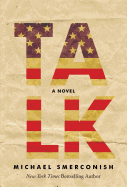
| Publisher: | Cider Mill Press | |
| Genre: | General, Political, Fiction, Media Tie-In, Satire | |
| ISBN: | 9781604334906 | |
| Pub Date: | May 2014 | |
| Price: | $24.95 |
| Starred | Fiction |
by Michael Smerconish
For his first foray into fiction, political commentator and radio host Michael Smerconish points his sharp satirical arrow at the U.S. political system and the role modern media play in corrupting democracy. Stanislaw Pawlowsky is a radio DJ who falls into the role of talk host when his Floridian station switches from rock music to conservative punditry. Provided with a "consultant," Stanislaw changes from a pot-smoking sloucher to Stan Powers, Tea Party activist. He doesn't share the political beliefs he's espousing, but he enjoys the income his fictional ideology rakes in.
A shocking announcement from the Democratic president leaves the upcoming election in upheaval, and as the conservative voice of the I-4 corridor in a crucial swing state, Stan has unmatched influence on the eventual outcome at the polls. This is his golden chance at fame and national syndication, and he must be willing to sacrifice anything--including his moral compass--to grab it.
Using a pointedly moderate voice, Smerconish aims at many factors that have made politics in the U.S. a battlefield where compromise and cooperation are as career-threatening as a radio personality dropping the f-bomb on air. His target may be a large one--encompassing dysfunctional primary elections, irrelevant mud-slinging and old-fashioned greed--but Smerconish certainly hits the bull's-eye.
The novel's colorfully diverse cast and party-neutral tone make this powerful satire attractive to most any reader. Funny, disturbing and most importantly thought-provoking, Talk has a lot to say; we should be listening. --Jen Forbus of Jen's Book Thoughts
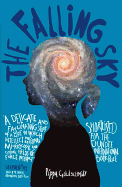
| Publisher: | Freight Books | |
| Genre: | Fiction, Literary | |
| ISBN: | 9781908754141 | |
| Pub Date: | May 2014 | |
| Price: | $13.95 |
| Fiction |
by Pippa Goldschmidt
Pippa Goldschmidt's The Falling Sky revolves around Jeanette, a young astronomer deeply dedicated to her work but uninspired by the competitive bureaucracy of postdoctoral research. The stars and galaxies make sense to her in a way that people do not; she is a talented and intelligent scientist whose rational lens often fails her in navigating the world of human relationships. In a Chilean observatory, she makes a discovery that could turn the scientific world on its head; what she will do with this new and disruptive evidence will similarly upend her personal life. Amid the commotion, a new love affair with an old friend and the disorder of her professional ambitions combine to reawaken a childhood trauma, a tragedy from which her family has never recovered.
The Falling Sky incorporates hard science (Goldschmidt is an astronomer as well as an accomplished writer) with the story of a young woman struggling to find and establish her own place in the world. Artists, romantics, philosophers, mystics, feminists, photographers and scientists will all identify with aspects of Jeanette's journey. Those familiar with the Edinburgh setting will be pleased by its evocation. But perhaps the most remarkable and unusual element of Goldschmidt's striking debut novel is Jeanette's perspective: the reader sees her world as she does, with an emphasis on objectivity, data points, the relativity of time and space, and the search for connections between distant galaxies. As Jeanette sighs, "the lack of information is appalling," but her story comes around to a satisfying conclusion nonetheless. --Julia Jenkins, librarian and blogger at pagesofjulia, with Hank Kastner, guest blogger
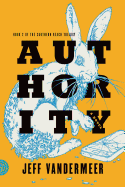
| Publisher: | Farrar, Straus & Giroux | |
| Genre: | General, Fiction, Fantasy, Literary | |
| ISBN: | 9780374104108 | |
| Pub Date: | May 2014 | |
| Price: | $15 |
| Science Fiction & Fantasy |
by Jeff VanderMeer
When Control is given the assignment of director at the Southern Reach, all he knows is that this has-been government agency is his last chance at a decent career. At first glance, the Southern Reach is a shadow of its former self: an underfunded group of scientists and bureaucrats assigned to research the elusive and mysterious phenomenon known as "Area X," which descended on the nearby coast decades earlier. The former director disappeared on the latest mission into Area X, and in her absence, Control finds the agency to be full of ghosts and madmen. She left behind strange writings, a plant that won't die and a trail of undecipherable signs. Control begins to suspect that the Southern Reach is less like a quietly decaying husk and more like a fetid, festering nurse log on the verge of bursting into a terrifying display of life. Worse, it seems that Area X is much closer than anyone suspects.
Authority is the second volume in his Southern Reach trilogy, and Jeff VanderMeer (Shriek) takes full advantage of the form. The creeping, atmospheric horror of Annihilation is submerged just below the surface in Authority, giving VanderMeer more room to develop his characters and move the plot forward. At its core, Authority explores the uneasy relationship between humans and true wilderness. The horror here is that loving nature can be a self-destructive impulse, and everything seems to point to the fundamental, terrifying impossibility of peaceful coexistence between man and wild. --Emma Page, bookseller at Wellesley Books in Wellesley, Mass.
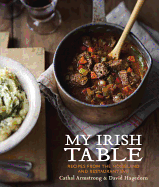
| Publisher: | Ten Speed Press | |
| Genre: | Regional & Ethnic, Cooking, Irish | |
| ISBN: | 9781607744306 | |
| Pub Date: | March 2014 | |
| Price: | $35 |
| Food & Wine |
by David Hagedorn, Cathal Armstrong
My Irish Table is an internationally recognized chef's homage to family dinners, Irish food and a father who inspired a son's love of cooking.
Cathal Armstrong, owner of several Washington, D.C.-area restaurants (Restaurant Eve, Eamonn's), is from a large Dublin family. His father grew more than 60 kinds of produce in a backyard garden that became the family's primary food source. He cooked dinners that stretched into the night and influenced Armstrong's culinary style, which combines Irish farm-to-table standards with sophisticated French culinary technique. Armstrong captures the current preference for traditional recipes prepared with rustic elegance and adds a few surprising twists. Spanish Omelet with Aioli may not be classically Irish, for instance, but it reflects those values.
The cookbook itself is beautiful. It is logically organized by menu type--breakfast, snacks, main courses, more ambitious recipes from Restaurant Eve and, of course, dessert--with plenty of photographs. The layout is thoughtful; you won't have to turn a page while cooking a dish, which makes the book easy to use in the home kitchen. Armstrong introduces most recipes with personal anecdotes, which adds a warm, celebratory note.
Armstrong is justifiably proud of his accomplishments as a successful restaurateur and leader in the sustainable-food movement, but he recounts his memories of hosting President Barack and Michelle Obama's anniversary dinner and his mother's simple cheese on toast with equal reverence. My Irish Table is a reminder of how central food is to memory and celebration, and that food, carefully prepared from the best ingredients, is a gift. --Jeanette Zwart, freelance writer and reviewer
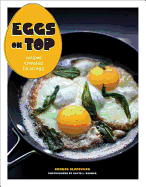
| Publisher: | Chronicle | |
| Genre: | Dairy, General, Specific Ingredients, Cooking, Courses & Dishes | |
| ISBN: | 9781452123684 | |
| Pub Date: | March 2014 | |
| Price: | $24.95 |
| Food & Wine |
by Andrea Slonecker
More than three decades after it was hatched, "The Incredible Edible Egg" jingle still has a spot in American pop culture. But there's nothing last-century about the recipes in culinary instructor Andrea Slonecker's Eggs on Top, an homage to the ovoid nuggets of protein.
"Learn to Cook an Egg and You Can Cook Anything," the cover announces, and from the introductory Egg Primer through the concluding Eggs on Leftovers chapter, Slonecker gives cooks all the help they need to prove her claim. A brief overview of the basics--what differentiates large from jumbo or A from double A, shell color, parentage (chicken, duck, "adorable" quail)--includes a defense of eggs' nutritional value, debunking the theory that they raise cholesterol and contribute to heart disease. She sorts out the carton claims, too, defining free-range, humane and other considerations. The photos throughout illustrate eggs in various degrees of doneness: a nine-photo spread shows the interiors of eggs boiled for different lengths of time, and poaching is broken down into clear steps.
With egg literacy out of the way, Slonecker encourages cooks to create impressive main dishes, ranging from a snazzy breakfast of Sri Lankan crepes to an Earthy Stew of Chickpeas and Swiss Chard with Crunchy Eggs (which is to say, deep-fried). Slonecker even suggests beverage pairings, such as a flute of champagne alongside leeks vinaigrette and herbed quail eggs.
A conversational tone, whimsical fonts and layout, and clear step-by-step coaching will encourage even a novice cook to get crackin'. --Cheryl Krocker McKeon, manager, Book Passage, San Francisco
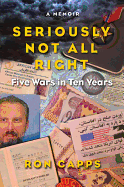
| Publisher: | Schaffner Press | |
| Genre: | Veterans, History, Biography & Autobiography, Military | |
| ISBN: | 9781936182589 | |
| Pub Date: | May 2014 | |
| Price: | $25 |
| Biography & Memoir |
by Ron Capps
Ron Capps's debut memoir is an incisive look at the cost of combat and peacekeeping missions, and the limits of extreme violence humans can tolerate when they're powerless to stop it. Seriously Not All Right is also a harrowing and ultimately redemptive look at Capps's climb out of the post-traumatic stress disorder pit and what he did to help others once he succeeded.
Capps served as a military intelligence officer in Iraq and Afghanistan before becoming a civilian foreign service observer in hot spots like Kosovo and Darfur. In the latter role, Capps performed his duties admirably and professionally, but wartime memories manifested themselves at the worst moments, resulting in his admission that he was "seriously not all right" before he sought help. Capps's emotional breakdown felt imminent; he tried to balance desk work while old movies of genocidal horror spooled out in his head. Capps's meandering and sometimes unsuccessful attempts to get aid bear witness to both the challenges combat veterans face in obtaining the support they need and the many dedicated helpers bound by bureaucratic obstacles and limited resources. Eventually, Capps took his method for battling depression and shared it with others; he created the Veterans Writing Project to give voice and solace to fellow veterans.
In addition, Capps's diagnosis of what is awry with American statecraft and military intervention is spot on, the learned wisdom of one who has been there and done that. This is a well-written, timely memoir, with scene after vivid scene that lingers, that provides a possible healing path for veterans. --Donald Powell, freelance writer
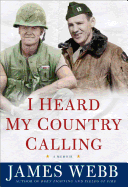
| Publisher: | Simon & Schuster | |
| Genre: | Biography & Autobiography, Military, Personal Memoirs | |
| ISBN: | 9781476741123 | |
| Pub Date: | May 2014 | |
| Price: | $27 |
| Biography & Memoir |
by James Webb
The title of James Webb's memoir, I Heard My Country Calling, is borrowed from a 1912 poem by Sir Cecil Spring-Rice, who influenced the Woodrow Wilson administration to join Britain and France in the war against the Central Powers. Webb, author of the novel Fields of Fire, a former Secretary of the Navy and decorated Marine, heard his own call through his father's dedicated military service. Living in England while his father--a World War II pilot and scientist--instructed members of the Royal Air Force helped young Webb appreciate Britain's pride and loss as its empire crumbled in the postwar period.
If Europe represents the past for Webb, Asia has always been the future. A mango in an Air Force base commissary was Webb's teenage epiphany, its flesh and sticky juice his holy communion, transforming him into "a blood brother to the people... in the far realms." Unreservedly proud of his service in Vietnam, Webb challenges the prevailing notion that the war was fought incompetently by the U.S. and its allies. He asserts that far from being a "dirty little war" where the bombs did all the work, the Vietnam War "was the most costly [ground] war the U.S. Marine Corps has ever fought" in terms of body count. Despite what he considers the country's heroic efforts, Webb concludes the war was lost due to U.S. leaders' inability to understand the enemy's insular form of terrorism that combined seduction with violence.
Whether the reader agrees with Webb's perspectives on the Vietnam War, his narrative makes for a deeply sobering, poetic read. It reflects the author's sharp cultural acumen and an unwavering sense of responsibility laced with stoicism. --Thuy Dinh, editor, Da Mau magazine
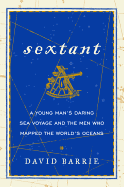
| Publisher: | Morrow | |
| Genre: | Expeditions & Discoveries, Transportation, Marine & Naval, History, Technology & Engineering, Navigation | |
| ISBN: | 9780062279347 | |
| Pub Date: | May 2014 | |
| Price: | $25.99 |
| History |
by David Barrie
Almost entirely outmoded because of the ease of GPS tracking and usually relegated to the maritime swap meet, the sextant was once a critical tool for sailors to pinpoint their location at sea. With it, they could measure the angle between two visible objects and then calculate their own position in relation to them on a nautical chart. Here sailor David Barrie brings us the history of the sextant, the men who used it and what it helped humankind accomplish.
The adventures of sailors like James Cook, Robert FitzRoy and Joshua Slocum provide a backdrop for Barrie to discuss the development of the sextant, whose origin came by way of navigational principles developed by Sir Isaac Newton and the resulting instrument--the octant. Admiral John Campbell found the octant insufficient; making alterations to it, he invented the sextant in 1757.
Barrie not only documents the stories of these men, he recounts his own transatlantic journeys using a sextant. "The practice of celestial navigation extends our skills and deepens our relationship with the universe around us. What could be more wonderful than to join the long line of those who have found their way across the seas by the light of the sun, moon and stars?"
Even for armchair adventurers with no sea legs to speak of, Barrie's Sextant is a compelling read, ensuring that at least the memory of this significant navigational tool is not lost to antiquity. --Jonathan Shipley, freelance writer
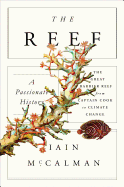
| Publisher: | Scientific American | |
| Genre: | Natural History, History, Life Sciences, Marine Biology, Oceania, Science | |
| ISBN: | 9780374248192 | |
| Pub Date: | May 2014 | |
| Price: | $27 |
| Starred | Nature & Environment |
by Iain McCalman
With The Reef, Iain McCalman (Darwin's Armada) has composed "a passionate history" of the Great Barrier Reef, opening with his own long-awaited voyage (part of a reenactment of Captain Cook's original trip). He then shifts to the role of historian and chronicles the Great Barrier Reef as known to Western society over the last few centuries.
The Reef is divided into three parts. Beginning in 1770 with Captain Cook and proceeding through later explorers who helped chart the reefs in the 1800s, the first part, "Terror," emphasizes the threat the reef posed to ships and their navigators, and the fear of cannibals and others thought to inhabit the area. In Part II, "Nurture," the reef begins to offer refuge for those seeking to escape civilization or make a fresh start; naturalists arrive, captivated by the biodiversity and beauty of the area while beginning to realize that coral is a resource that can be exploited. In the last part, "Wonder," the scientific community takes an interest and activists fight to defend the unusual and changing ecosystem. Returning to the personal nature of his prologue, McCalman's epilogue speaks to the grim consequences of climate change but holds forth hope as well.
This work's strengths include a coherent structure, friendly narrative style and a reasoned culminating call to action that does not disrupt its primary role as a comprehensive history. Plentiful notes indicate strong research, but McCalman's writing is accessible to any reader interested in the intersection of science, nature and history. From perceived threat to resource to paradise destination to climate-change indicator, the Great Barrier Reef is fully explored in this engaging study. --Julia Jenkins, librarian and blogger at pagesofjulia
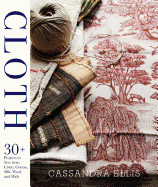
| Publisher: | Stewart, Tabori, & Chang | |
| Genre: | Crafts & Hobbies, Sewing, Decorating | |
| ISBN: | 9781617691096 | |
| Pub Date: | March 2014 | |
| Price: | $35 |
| House & Home |
by Cassandra Ellis
"We are all born to make," Cassandra Ellis (Quilt Love) notes in the introduction to Cloth. "I make, therefore I am." Ellis, a longtime collector of vintage and unusual fabrics, drew inspiration from five of her favorite natural materials to create the projects in her second book.
Each section starts with a primer on the material's history and characteristics: the different weaves and weights of cotton, the delicacy and strength of silk, the complex process of curing and tanning leather. Ellis also considers the ethics of each material, from the ecological benefits of organic cotton to the political implications of handwoven cloth (khadi) in India. Her enthusiasm for textiles as both raw materials and finished products is evident on every page.
The projects range in size and complexity from simple linen slippers and tea-dyed silk drawstring pouches to a wooden stool topped with fluffy sheepskin and a tartan wool overnight bag. Many of the projects are home goods or accessories (handbags, curtains, a braided rag rug, a kimono silk quilt), but a few are wearable (a dark denim apron, a tie-dyed shawl). All of them use high-quality materials to transform humble objects into daily luxuries. A handy back pocket contains the corresponding paper patterns. For the adventurous crafter, Ellis includes a primer on natural dyeing.
Lavishly illustrated and full of practical tips, Cloth embodies the William Morris esthetic by which Ellis lives: like the objects in its pages, it is both beautiful and useful. --Katie Noah Gibson, blogger at Cakes, Tea and Dreams
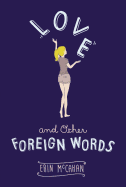
| Publisher: | Dial | |
| Genre: | Friendship, Love & Romance, Social Issues, Family, Juvenile Fiction, Siblings, Humorous Stories | |
| ISBN: | 9780803740518 | |
| Pub Date: | May 2014 | |
| Price: | $17.99 |
| Starred | Children's & Young Adult |
by Erin McCahan
Readers will fall for Josie Sheridan, the charming and funny genius narrator of this contemporary novel about navigating the rough waters of love in its many forms.
Josie, who turns 16 during the course of the book, likes to have a formula for everything. She does not like change. She feels at home in her family--she's the youngest of three daughters of happily married parents--and with their neighbors, the Wagemakers. Auntie Pat and Uncle Ken Wagemaker are her parents' closest friends, and their children, Sophie and Stu, are Josie's closest friends. Josie's banter with Stu, also a genius, provides the high points and through line of the novel. When Josie's middle sister, Kate, brings home Geoff, and announces their engagement, it rocks Josie's world ("Are we to have no more confidences as sisters now?" Josie asks Kate). Josie decides she needs to fall in love in order to earn credibility with Kate and halt this marriage. But Josie discovers that though she has a passion for words and speaks many languages, love is one she can't seem to master.
Erin McCahan achieves a rare feat: she creates a family with distinct, admirable characters. Josie's parents are there for her but also give her room to navigate uncharted waters. The exchanges between Josie and her father are among the best in YA literature. As with her oil-and-water reaction to Geoff, Josie sometimes misses what's right in front of her. Readers may see the ending coming before Josie does, but that's also what's so lovable about Josie. --Jennifer M. Brown, children's editor, Shelf Awareness
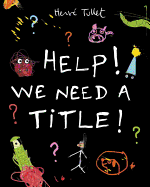
| Publisher: | Candlewick | |
| Genre: | General, Legends, Myths, & Fables, Juvenile Fiction, Humorous Stories, Royalty (kings queens princes princesses knights etc.) | |
| ISBN: | 9780763670214 | |
| Pub Date: | May 2014 | |
| Price: | $16.99 |
| Children's & Young Adult |
by Hervé Tullet
The genius creator of Press Here once again involves readers in the action--this time as the audience that inspires his characters to improve upon their story.
"Hey! Someone's watching us!" says a blonde character outlined in black brushstrokes, dressed in a pointy hat (we later learn she's a "beautiful, kind fairy"), to a pig painted in broader pink outlines. Some freely applied green paint in the upper left corner of a gray frame suggests a curtain. The self-conscious duo invites others onstage (a dog, a snake), as they direct questions to the audience ("Who are you? What do you want?"). They consider what readers might want: "We could try adding a bit of background color," says the snake. "Maybe they'd like a landscape?" says a blue pastel stick figure with a block-shaped body, "I'll go find one!" They introduce other elements--a comical red-scribbled "bad guy" with frog-like eyes and the word "Boo!" inside its cavernous mouth. Out of ideas, they consult a pro: "Hey, author!" they yell. A photo of Hervé Tullet appears above a drawn-in body and a primly organized table; on it is a sheet with the previously introduced characters all lined up ("Uh-oh! He doesn't look too happy," it says). Though he insists he's not finished yet, the characters coax the author to "at least try!"
While the characters may be critical of their author, youngsters will be thoroughly entertained by the interplay between Tullet and his creations. This could launch all kinds of discussions about the ingredients for a good story. --Jennifer M. Brown, children's editor, Shelf Awareness